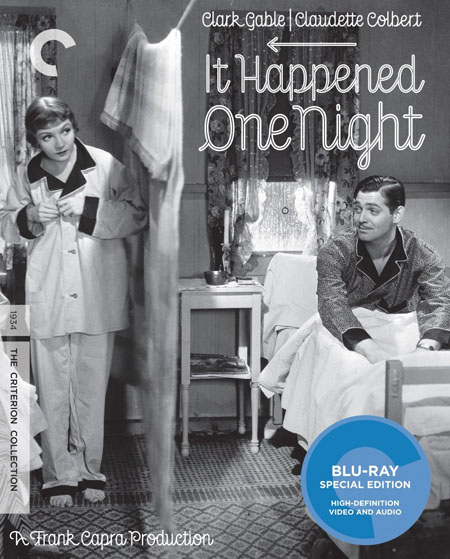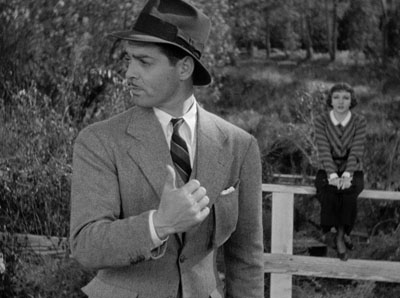
HITCHHIKING LESSONS
By Raymond Benson
The
first time a comedy swept the Academy Awards was in 1934, when Frank Capra’s It Happened One Night took home the
prizes for Best Picture, Best Director, Best Actor (Clark Gable), Best Actress
(Claudette Colbert), and Best Screenplay. (The next time all five major awards
were snagged by one picture was in 1975 for One
Flew Over the Cuckoo’s Nest.)
It
was the beginning of the screwball comedy movement. It Happened One Night may not have been the first screwball comedy,
and it may not even really be a
screwball comedy (according to critics Molly Haskell and Phillip Lopate, in a
video conversation supplement in which they discuss screwball comedies, Happened is lacking in the chaotic
elements that one would find in, say, Twentieth
Century, which came out the same year, or even Bringing Up Baby, perhaps the quintessential screwball comedy). But
while Capra’s beloved film is often lumped into the category of screwballs, one
thing is certain—it’s the archetype for the modern American romantic comedy. And Hollywood keeps
remaking it, so to speak, over and over.
The
picture came out in early 1934 when the movie business was still in the
“pre-Code†era (the Hays Code didn’t kick in full-force until July 1 of that
year), so Capra and company were able to get away with some rather risqué
elements, such as two unmarried people bunking up in a motel together with only
the “wall of Jericho†between them. Or Clark Gable demonstrating the fine art
of how men remove their clothes. Or Claudette Colbert revealing her shapely
gams in order to catch a ride on the road. Yes, that’s one thing we learn from It Happened One Night—how to hitchhike.
Frank
Capra was hired by the poverty-row studio, Columbia, as the talkies began, and
in a few short years the director elevated the company to the majors. He then
began a hugely successful run, winning three Best Director Oscars in five
years. His pictures later became known as “Capra-corn,†for their idealistic
and sometimes sentimental look at Americana. But, as pointed out in the
excellent supplemental documentary included on the disc, Capra’s films
definitely had a dark side to them. Perhaps not so much in Happened, but the evil that men do is certainly present in, say, Mr. Smith Goes to Washington or It’s a Wonderful Life.

It Happened One
Night is
an excellent lesson in screenwriting, structure, dialogue, and pacing. It’s a
near-perfect picture, and it’s still funny today. Gable is at his most winning.
Colbert is terrific, although it’s stated several times throughout the
supplements how much of a snooty b*tch she was during filming—she didn’t want
to make the picture, complained the entire time, insisted on twice her normal
salary to do it, and told friends after its completion that she’d just made the
worst movie in her career. She changed her tune after winning the Oscar, and
then she had nothing but praise for Capra and the film. Those fickle movie
stars.
Criterion
does their usual bang-up job. The new 4K digital restoration is gorgeous.
Extras include the previously mentioned Haskell/Lopate video; the
feature-length documentary on Capra, Frank
Capra’s American Dream; an interview with Frank Capra Jr. from 1999; a new
digital transfer of Capra’s very first film, the silent 1921 Fultah Fisher’s Boarding House, with a
new score by Donald Sosin; and—the most interesting—the hour-long televised AFI
tribute to Capra from 1982 (it’s great fun playing spot the celebs!). An essay
by critic Farran Smith Nehme fills the glossy booklet.
One
for the history books.
CLICK HERE TO ORDER FROM AMAZON